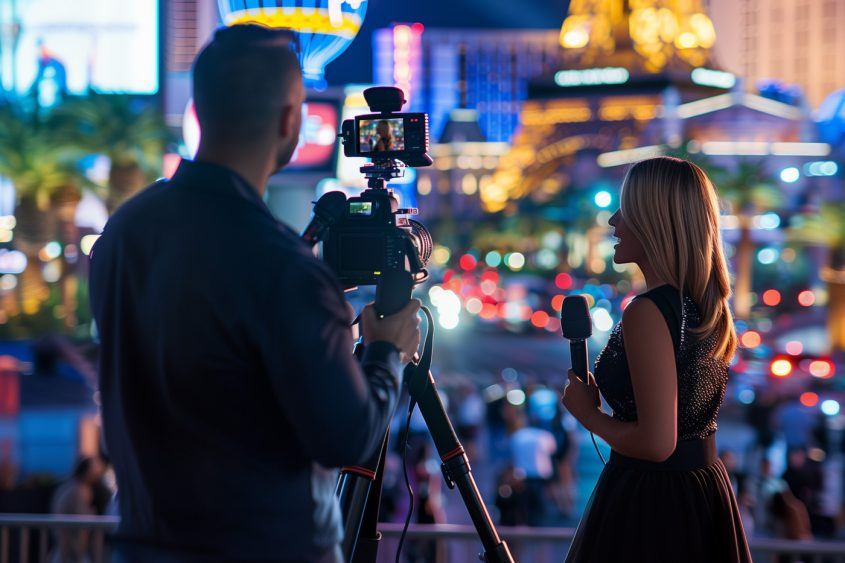Most of our stories are for Las Vegas visitors, but sometimes we like to look inward and opine about Las Vegas news media, despite the fact we aren’t entirely sure what “opining” entails. Is there stretching involved? Can opine sap be removed with rubbing alcohol? What personal pronoun does one give a transitive verb?
We are a Las Vegas news outlet, of sorts, so it’s fascinating to examine and explore how people get their news and from whom.
One of the more surprising things about local TV news is the size of their respective viewerships. Some of the numbers are downright shocking. These stats aren’t widely available, which is one of the things that makes them interesting, so let’s go.

If you follow Las Vegas news, you know the usual suspects when it comes to local TV stations: The major players are channels KSNV TV 3 (NBC), KVVU TV 5 (Fox), KLAS TV 8 (CBS) and KTNV TV 13 (ABC).
So, how big are the audiences for local TV news in Las Vegas? Note: When we talk about viewership numbers, we’re talking about weekday broadcasts.
Here are the viewership numbers for local Las Vegas TV stations as of Feb. 26, 2024.
KSNV TV 3 (NBC)
5 a.m. – 5,600
6 a.m. – 10,200
12 noon – 12,600
5 p.m. – 23,900
6 p.m. – 13,900
6:30 p.m. – 9,700
7 p.m. – 8,400
11 p.m. – 10,400
KVVU TV 5 (FOX)
5 a.m. – 9,900
6 a.m. – 16,800
7 a.m. – 23,500
8 a.m. – 23,400
9 a.m. – 21,900
10 a.m. – 10,000
11 a.m. – 8,000
3 p.m. – 11,700
2 p.m. – 9,500
1 p.m. – 7,900
4 p.m. – 12,500
5 p.m. – 14,800
5:30 p.m. – 14,800
6 p.m. – 8,500
6:30 p.m. – 8,800
7 p.m. – 6,700
10 p.m. – 16,700
11 p.m. – 7,400
KLAS TV 8 (CBS)
5 a.m. – 4,500
6 a.m. – 7,600
12 noon – 8,700
3 p.m. – 5,000
4 p.m. – 6,500
5 p.m. – 14,500
6 p.m. – 14,000
6:30 p.m. – 14,200
11 p.m. – 9,200
KTNV TV 13 (ABC)
5 a.m. – 3,100
6 a.m. – 5,800
9 a.m. – 3,900
11 a.m. – 13,900
3 p.m. – 4,800
5 p.m. – 22,400
6 p.m. – 7,700
6:30 p.m. – 22,400
7:30 p.m. – 20,700
11 p.m. – 9,800
Not sure about you, but we find these viewership numbers to be eye-opening.
The average audience size for Channel 3 is about 12,000 people. For Channel 5, it’s about 13,000. Channel 8’s average audience size is 9,300, and for Channel 13, it’s 11,000.
Two of Channel 13’s time slots garner less than 4,000 people, or about the same number of people in the typical drum circle at Burning Man.
Channel 3 has the biggest audience in local TV for its 5:00 p.m. time slot, 23,900 viewers.
For some perspective, Las Vegas metro has about 2.3 million residents.
The Las Vegas Review-Journal has about 180,000 subscribers. That’s rounding up.
In the social media world, a Tweet that doesn’t get 50,000 impressions is a fail. Tweets with a million impressions aren’t uncommon for popular Las Vegas accounts.
This isn’t an apples to apples comparison, but it’s intriguing given the amount of resources devoted to local television production. Advertisers apparently feel they get return on their investment, so local news keeps cranking out content.
We feel for these folks (many of whom are friends), as their schedules are relentless, and they take a lot of flak for not doing actual journalism. There simply isn’t enough time or money, as there are so many hours of air to fill. For example, Channel 5 has 18 30-minute shows to produce, every day!
Local news is interesting on so many levels, including the demographics of who’s watching.
The fact there’s a lot of emphasis placed on weather is telling of who gets their news from local TV. Las Vegas weather doesn’t really change too much, so when something happens, our meteorologists lose their minds.
In the local news realm, beyond the weather, it’s all about crime and traffic. Lately, sports have entered the chat.
The Pew Research Center put out some illuminative stats about local news viewerships: “Relatively few Americans ages 18 to 29 (15%) follow local news very closely, compared with about three-in-ten (28%) of those 30 to 49 and about four-in-ten (39%) of those 50 and older. Black Americans show a stronger connection to local news: Just under half (46%) follow it very closely, while about a quarter (28%) of white Americans do the same, along with about a third (34%) of Hispanic adults. And about a third of Americans with a high school diploma or less education (36%) are very interested in local news, more so than those who have attended some college (30%) or received a college degree (25%).”

With all the ways of keeping up with news, and what the weather’s going to be, we trust local TV news is grappling with many of the same challenges as newspapers (the country has lost a third of its newspapers since 2005).
Our biggest gripe with local TV news is how they share so many stories online that have nothing to do with Las Vegas. Drawing from news feeds, they pass along any quirky story they can find, filling up Twitter feeds and other social platforms with white noise. If any bacteria of any kind eats anyone’s face in any of the continental United States, you’re going to see a story from a local TV station, guaranteed. Ditto if a raccoon gets its head stuck in a peanut butter jar. It’s the law.
It’s an attempt to control costs while doing their best to keep up with the 24/7 news cycle that’s ruining everything. We get it. We are one of the news outlets ruining everything. There’s a race to be first, and that race is never really won, because the appetite for news is insatiable. Nuance is dead. News is dumbed down, and is designed to evoke strong emotions, usually some form of rage. We blame F1, but we blame F1 for everything.
Here’s to the folks who get up far earlier than we ever will, and check their Doppler radar machines, and work long hours to bring us the news we’re told we should care about in whatever retirement community we call home.




